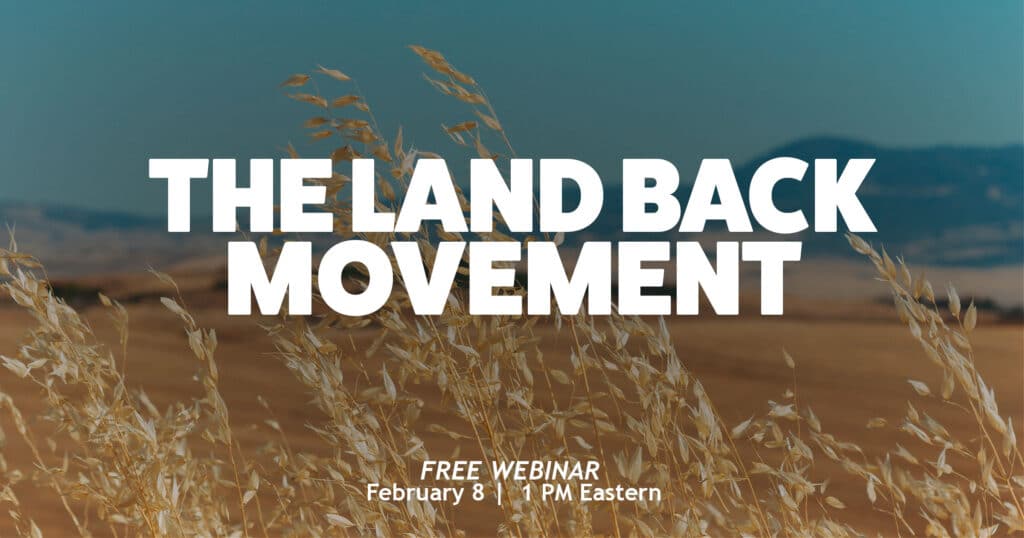Land Back to Indigenous hands must be collective task, advocates urge
The Land Back movement is bigger than any one person’s property. That’s the premise that centered the conversation during a Feb. 8 United Church of Christ Creation Justice webinar to address ways to engage with this movement.
The Land Back movement advocates for transferring decision-making power for land back to Indigenous communities. It includes looking broadly at things like government-held and public land, noted speaker Sarah Augustine, though she often hears questions that focus on personal property. People, she said, respond to the movement by asking about their own properties or by saying they do not own property.
“One of the things I think is challenging in the U.S. is this cultural emphasis on individualism,” she said. “One thing I want to ask us to consider is what is Land Back from a systemic viewpoint, beyond my home or family? What does it mean from a collective point of view?”
Augustine is a Pueblo (Tewa) descendant, founder and co-chair of the Coalition to Dismantle the Doctrine of Discovery and co-founder of the Suriname Indigenous Health Fund. The webinar also featured speakers Katerina Gea, a member of the Coalition and pastor of California’s Wild Church Fresno, and Angie Comeaux from Hummingbird Springs Farm in Alabama. She also represents the New Orleans area Bvlbancha Collective for Indigenous mutual aid and Okla Hina Ikhish Holo (People of the Sacred Medicine Trail).
Undoing injustice
The Church’s relation to Indigenous land traces back to the 15th century Doctrine of Discovery, a philosophical and legal framework that justified and permitted acts of Christian governments to seize Indigenous lands and dominate Indigenous people. This doctrine grew out of Christian principles with scriptural backing, and undergirded many of the acts that colonized land and exploited Indigenous peoples.
Gea said that the Church, broadly speaking and including its many traditions and denominations, is now the largest non-government landowner in the world. As an institution that has historically justified colonization and benefitted from accruing so much land, the Church needs to consider its responsibility to get involved in the Land Back movement.
“We often say in my work, ‘What was done in the name of Christ needs to be undone in the name of Christ,’” said Gea.
Standing with Indigenous people
Speakers discussed practical ways to get involved in the Land Back movement, emphasizing that collective action can begin by looking to where Indigenous people are already working to recover land.
“Let’s talk about things like really standing together with Indigenous people as they are defining what lands are to be protected and seeking self-determination on those.” Augustine said. “There are Indigenous people already struggling. Can we join them in that struggle?”
Gea pointed to examples where lndigenous people worked successfully to protect land, citing the Wiyot Tribe’s victory in California where ancestral lands on Tuluwat Island were restored to them by the city of Eureka.
Comeaux mentioned the possibility of establishing land trusts, which create collective ownership of land and have started putting land back into Indigenous hands. She is working toward a land trust for her farm. “It’s hard for people to imagine giving back land,” she said. “But you can return land to Indigenous stewardship.”
Congregations can also consider joining the Repair Network of the Coalition to Dismantle the Doctrine of Discovery, speakers said.
The call to live in balance with the earth
The three frequently mentioned the dangers of living in extractive ways, referring to how natural materials are extracted from the earth in ways that cause irreparable damage. As climate justice work also responds to this problem, Augustine said that climate work can align with Indigenous values around land. But sometimes it doesn’t, she said, like when climate activists propose new extraction projects to mine green energy metals like copper. “That’s still an extractive model,” she said, “as opposed to saying that we need to live in balance with the earth” and learn from ways that Indigenous people have been stewarding the land.
Another concept frequently mentioned by speakers was decolonization. Comeaux described how colonization in this country was a process where people “systematically put their way of life on the people that were here… You have to take all of that away — that’s decolonization.
“Decolonization is a long, hard process because it’s so engrained in modern society in everything we do – capitalism, patriarchy, religion. Our entire lifeway is based on what we’ve been colonized to live in,” said Comeaux, who practices the native, earth-based spirituality she grew up immersed in. “Go to Indigenous people and ask them what they need. Listen to them. And ask earth what it needs – it’s a living being.”
Land acknowledgements
The webinar, which nearly 600 people registered to attend, is available for viewing on YouTube along with all previous creation justice webinars. The Rev. Brooks Berndt, UCC minister for environmental justice, has also created a follow-up post highlighting resources on Land Acknowledgements, which he said is a big topic for many churches.
Content on ucc.org is copyrighted by the National Setting of the United Church of Christ and may be only shared according to the guidelines outlined here.
Related News
A Prophetic Call for Justice and Peace in Palestine
The executive leaders of the United Church of Christ have issued the following statement...
Read More‘Love is Greater Than Fear’: Regional Youth Events get to the heart of gospel message
United Church of Christ teens attending this summer’s Regional Youth Events (RYE) are...
Read MoreUCC desk calendars available to order now
Prepare for your day, month and year with the United Church of Christ desk calendar —...
Read More


